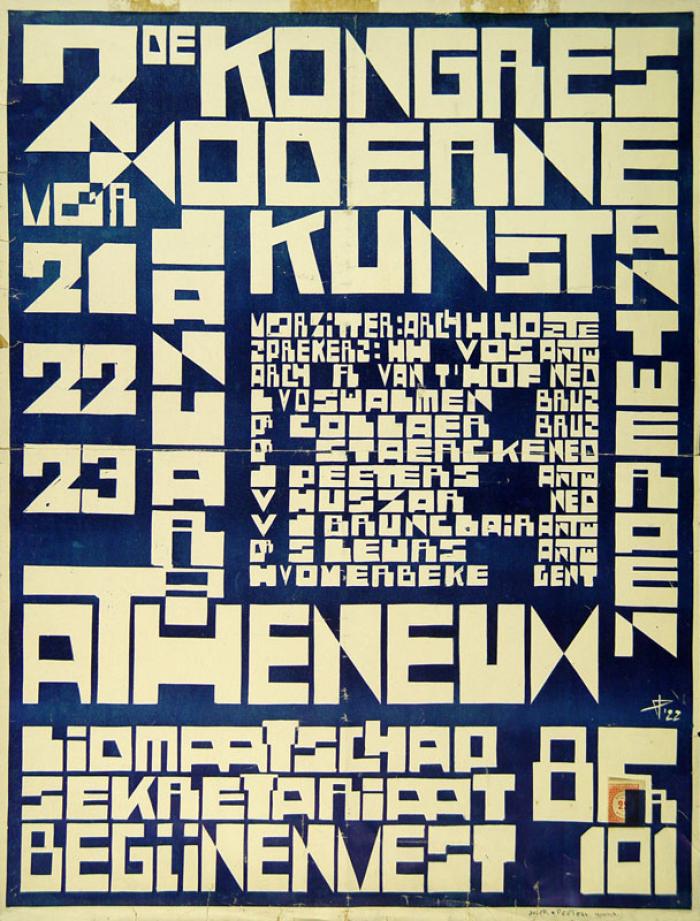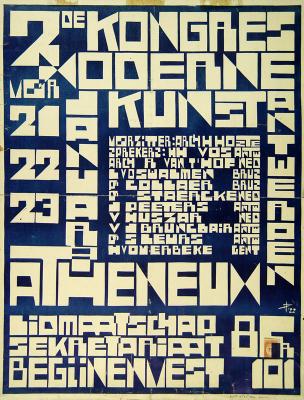The Kring Moderne Kunst (Modern Art Circle), established by Jozef Peeters in 1918 along with a few academic colleagues, develops a great deal of activities between 1920 and 1923. The most important feats are the three Congresses for Modern Art that catapult Peeters to being the frontman of the avant-garde in Flanders.
The 1st Congress for Modern Art is held on 10 and 11 October 1920 in Antwerp in the Beethoven Hall (Jozef de Bomstraat). Huib Hoste and Jozef Peeters are the organisers and Jozef Muls, the editor of the newspaper Vlaamsche Arbeid and Adjunct-Conservator of the Royal Museum of Fine Arts in Antwerp, is the Chairman. The radical social revolution, from a Flemish as well as international point of view, is central. Lectures are advertised by Peeters and Hoste themselves, as well as by Herman Craeybeckx (1897 - 1974), Eugeen De Bock (1889 - 1981), Victor De Meyere (1873 - 1938), Marnix Gijsen (1899 - 1984), Edward Léonard and Lode Ontrop (1875-1941). Vilmos Huszár (1844 - 1960), the Hungarian-Dutch painter, gave an unannounced lecture. Conjointly, an exhibition takes place from which no catalogue exists, though outside of Jozef Peeters, were probably also Jan Cockx (1891 - 1976), Jan Kiemeneij (1889 - 1981), Karel Maes and Edmond Van Dooren (1896 - 1965) there to participate. During the 1st Congress, the conflict is clear between the Flemish socially engaged humanitarian Expressionism, with De Bock and Gijsen as exponents on the one hand and the abstract movement on the other, which advocates the international tendencies of Constructivism, with contributions by Vilmos Huszár and Huib Hoste.
The true tour de force comes with the second edition. From 21 to 23 January 1922, with Peeters as Treasurer and Hoste as Chairman, they organise the 2nd Congress for Modern Art. There is a strong international delegation present, with important representation by the German group Der Sturm. The catalogue of the exhibition in the El Bardo Hall mentions, among others, Alexander Archipenko (1887 - 1964), Giacomo Balla (1871 - 1958), Rudolf Bauer (1889 - 1953), K. Boguslawskaja, Paul Klee (1879 - 1940) and Kurt Schwitters (1887 - 1948). For the Belgians, in addition to the core of the Modern Art circle and the group 7 Arts, there was also Vantongerloo and the unknown at the time ‘Tour’ Donas. E.L.T. Mesens (1903 - 1971) emerges as a musician. Also, Paul Van Ostaijen (1896 - 1928) is mentioned, though Peeters removes his works from the exhibition when he suspects that the submission is a parody. The congress that takes place in the ballroom of the Atheneum in Antwerp was at a high level, with lectures by Herman Vos (1928-2012), Louis Van der Swaelmen (1883 - 1929), Stan Leurs (1893 - 1973), August Stärcke (1880 - 1954), Paul Collaer (1891-1989), Huszár, Victor J. Brunclair (1899 - 1944), Herman van Overbeke (1895 - 1957), Peeters and J.J. Oud (1890 - 1963), who replaces the announced Van ‘t Hoff. Herman Vos’ address Over de politiek in verband met kunst, in which public art is preconceived, appears in April 1922 in Vlaamsche Arbeid. The national-international conflict played a role during the 2nd Congress for Modern Art, though the international avant-garde was already clearly preferred.
Peeters was inspired by the Arbeitsrat für Kunste in Berlin and launches the idea to establish an artists’ advisory in Antwerp with a strong emphasis on the applied arts. The resolution, however, gets bogged down in a theoretical discussion during the debates of the second congress. In order to avoid a repeat, during the following congress, a more pragmatic approach is chosen, with the emphasis on architecture and the applied arts. The 3rd Congress took place on 5 and 6 August 1922 in the Belfort Hall in Bruges with Hoste as the Chairman once again. The exhibition ran from 30 July to 15 August 1922. This congress was combined with the Flemish Scientific congresses and a congress of library personnel and was much less ambitious in nature, with merely one international invited. The lectures were given by Wies Moens (1898 - 1982), E.L.T. Mesens, Hoste, Leurs, Peeters and Maes, whose intervention was enthusiastically received.
Sergio Servellón
CC-BY-NC (Creative Commons 4.0)

